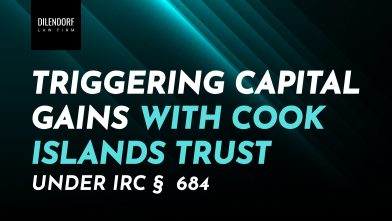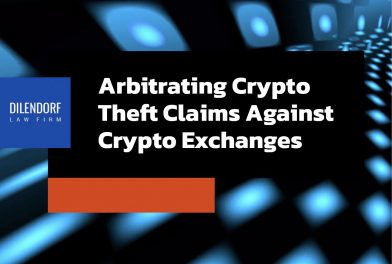Launching a Real Estate Fund: Tokenized or Traditional
Please contact our team for a consultation to discuss your plans for launching a real estate fund. Email: info@dilendorf.com. Phone: 212.457.9797.

Dilendorf Law Team prepared this summary for launching private (traditional + tokenized) real estate funds and describes the compliance implications for real estate funds under the US federal and state securities laws.
Our clients are advisers to real estate funds, and we regularly counsel clients with respect to the formation and offering of interests in traditional and tokenized real estate funds they advise.
This summary is intended to help emerging and established real estate fund managers understand securities laws considerations and exemptions when designing a real estate fund structure.
It’s not intended to be a comprehensive description of all federal and state securities laws and rules that may apply to transactions conducted with offers, sales and issuance of traditional or tokenized real estate fund securities.
Whether certain real estate fund activities require registration of the offering of securities, broker-dealer registration, investment company registration, or investment adviser registration is a fact-specific analysis that must be conducted on a case-by-case basis.
Specifically, this summary discusses:
- What are private (traditional + tokenized) real estate funds;
- When interests in private real estate funds would be “securities” under federal and state securities laws;
- Registration of securities offerings with the SEC and/or state securities regulators and potential exemptions from securities registration for investments in a real estate fund (particularly through Rule 506 of the Federal Regulation D);
- When is a real estate fund manager eligible to use the exemptions under Rule 506?
- Timeline for launching an exempt real estate fund;
- Fees for launching a real estate fund and reimbursement of formation fees to a fund manager;
- Restrictions under state law applicable to Rule 506 real estate fund offerings;
- Registration and exemptions from registration for a real estate fund are “investment companies” and considerations for advisers to a real estate fund;
- Regulations of a real estate fund’s investment adviser;
- Keys terms of the real estate fund; and
- Issuance of tokenized fund shares.
1.What are private real estate funds?
A private real estate fund is an entity created to pool money from multiple investors—often referred to as limited partners.
Each investor makes an investment in the fund by purchasing an interest in the fund entity, and the adviser uses that money to make real estate investments on behalf of the fund.
Real estate funds invest primarily in direct, illiquid private real estate, real estate preferred equity, note receivables and various other miscellaneous-related investments (forming a type of security token).
In a tokenized fund, a fund manager could create blockchain tokens representing investors’ ownership interest in a fund.
The benefit of tokenization is that all operations like token issuance, investor subscription, preferred return distributions, and secondary market trading are managed via blockchain smart contracts without any physical paperwork.
These tokens would be treated as securities in the US, and so all regulatory requirements, including jurisdictional restrictions, KYC/AML, are automatically enforced via smart contracts.
Chief among the advantages of tokenization is liquidity. Currently, limited partnership interests in private (traditional) funds are considered relatively illiquid. Tokenized fund interests (security tokens) could be on regulated security token markets aks alternative trading systems (ATS) in complied with federal and state securities regulations.
2.Are interests in private real estate funds “Securities”?
All offers, sales, and issuance of securities are governed by federal securities rules and regulations.
Under federal and state laws, securities are defined broadly to include shares of limited partnership interests and membership interests in an LLC, LLP and investment contracts.
Interests in a private real estate fund offered and sold to investors will typically constitute securities within the meaning of federal and state laws.
As a result, private real estate funds must comply with all applicable regulations of the Securities and Exchange Commission (“SEC”) and the securities regulators in the states where a real estate fund operates. This includes being aware of, and complying with, applicable provisions such as the registration and anti-fraud provisions of federal and state securities laws.
3. Are real estate fund offerings required to be registered with the SEC Commission and the states, or are exemptions from registration available?
Under the federal Securities Act of 1933 (Securities Act), all offers and sales of securities must be either (1) registered with the SEC or (2) conducted in compliance with an exemption from registration. State securities laws also require registration or an exemption from registration before securities may be offered or sold in the state.
Securities regulators interpret broadly the meaning of the term “offer.” For example, advertising a business opportunity could be considered an offer; therefore, it is prudent to assume that efforts to attract investors to a real estate fund are offers of a security and subject to federal and state securities laws.
The good news is that offerings of private real estate fund interests may not need to be registered with the SEC or state securities regulators if an exemption from registration is available.
Federal and state securities laws contain several exemptions from registration that fund managers could rely on when launching a real estate fund. For example, some frequently used exemptions from registration that may be available to real estate fund operators include:
- Rule 506(b) of Regulation D, which provides an exemption from registration for a private offering to accredited investors and up to 35 sophisticated investors; and
- Rule 506(c) of Regulation D, which provides an exemption from registration for an offering that may be conducted publicly so long as the real estate fund takes reasonable steps to verify the accredited investor status of each purchaser.
4. When is a real estate fund manager eligible to use the exemptions under Rule 506?
Rule 506 of Regulation D provides two distinct exemptions from registration for companies when they offer and sell securities.
Real estate funds relying on the Rule 506 exemptions can raise an unlimited amount of money from unlimited amount of accredited investors.
In addition, the issuer is required to file a notice with the SEC on Form D within 15 days after the first sale of securities in the offering.
The principal exemptions in Rule 506 are in subparagraphs (b) and (c).
- Rule 506(b)
In an offering under Rule 506(b), the real estate fund sponsor is not permitted to use general solicitation or advertising to offer the fund’s securities and offers and sales are limited to “accredited investors” and up to 35 sophisticated, non-accredited investors.
If non-accredited investors are participating in the offering, the issuer must give any non-accredited investors a disclosure document that generally contains the same type of information as provided in registered offerings
- Rule 506(c)
Under Rule 506(c), a real estate fund can broadly solicit and generally advertise the offering and still be deemed to be in compliance with the exemption’s requirements if:
- The investors in the offering are all accredited investors; and
- The company takes reasonable steps to verify that the investors are accredited investors
Purchasers of securities offered pursuant to Rule 506 receive “restricted” securities, meaning that the securities cannot be sold for at least six months or a year without registering them.
5. How long does it take to launch an exempt real estate fund offering?
The average timeline for structuring and launching a real estate fund offering exempt from registration with the Securities and Exchange Commission is 3-5 weeks.
It could take 6-8 weeks to launch an exempt tokenized real estate fund, shares of which can be traded on regulated security token marketplaces also known as alternative trading systems operated using blockchain technologies.
Whether certain real estate fund activities require investment company registration, or investment adviser registration is a fact-specific analysis that must be conducted on a case-by-case basis.
6.How much does it cost to launch a real estate fund and reimbursement of formations fees to a fund manager?
The fees (legal, registration, tax) for launching a stand-alone a real estate fund could range between $35,000 to $60,000. Ongoing annual fund administration fees could vary between $15,000 – $25,000. The fees for launching a tokenized real estate fund could be as high as $100,000.
The fund reimburses the fund managers all actual costs and expenses incurred in connection with the formation, organization, legal and marketing of the fund. The fund can amortize such costs over a three or five years and reimburse the general partner for advancing costs and fees on behalf of the fund.
7.Are there any restrictions under state law applicable to Rule 506 real estate fund offerings?
Although federal law preempts state registration and qualification under Rule 506, the states have the authority to require notice filings and collect state fees in connection with real estate fund offerings.
In almost every state, a real estate fund sponsor making a Rule 506(b) or Rule 506(c) offering could be required to submit a notice to state regulators within 15 days of the first sale to an in-state investor.
Issuers should contact state securities regulators in the states in which they intend to offer or sell securities for further information on state requirements.
8.Is the real estate fund required to register an “Investment Company”?
Real estate funds can also implicate the registration provisions of the Investment Company Act of 1940 (Investment Company Act) and, potentially, the Investment Advisers Act of 1940 (Advisers Act) or related provisions of state securities laws.
The Investment Company Act generally defines an “investment company” as an issuer which:
- Is or holds itself out as being engaged primarily, or proposes to engage primarily, in the business of investing, reinvesting or trading in securities;
- Is engaged or proposes to engage in the business of issuing face-amount certificates of the installment type, or has been engaged in such business and has any such certificate outstanding; or,
- Is engaged or proposes to engage in the business of investing, reinvesting, owning, holding or trading in securities, and owns or proposes to acquire “investment securities” having a value exceeding 40 percent of the value of its total assets (exclusive of government securities and cash items) on an unconsolidated basis.
Absent an exclusion from this definition or an exemption from requirements to register, entities meeting this definition are generally subject to the registration provisions of the Investment Company Act.
As noted above, real estate funds typically are pooled investment vehicles through which investors contribute funds to invest in real estate projects.
Depending on the facts and circumstances, real estate funds may have to register as investment companies under the Investment Company Act.
9.Are there Exclusions from the definition of an investment company that might apply?
Below are some high-level summaries of exclusions from the definition of “investment company” under the Investment Company Act that might apply:
Private Fund Exclusions – Section 3(c)(1) and Section 3(c)(7)
Section 3(c)(1) of the Investment Company Act states, in part, that an issuer is not an investment company if its outstanding securities (other than short-term paper) are beneficially owned by not more than 100 persons.
Section 3(c)(7) of the Investment Company Act states, in part, that an issuer will not be an investment company if its outstanding securities are owned exclusively by persons who, at the time of acquisition of such securities, are “qualified purchasers” and it is not making and does not at that time propose to make a public offering of its securities. For purposes of this provision, the term “qualified purchaser” is defined by Section 2(a)(51) of the Investment Company Act.
Private Real Estate Fund Exclusion – Section 3(c)(5)(c)
Under Section 3(c)(5)(C), an issuer generally will not be considered an investment company if it is not engaged in the business of issuing redeemable securities and if, in part, it is primarily engaged in purchasing interests in real estate.
Real estate funds that primarily invest in qualifying investments may be eligible for the exemption under Section 3(c)(5)(C).
Whether Section 3(c)(5)(C) could be used for launching a tokenized real estate fund is a fact-specific analysis that must be conducted on a case-by-case basis.
In summary, Advisers Act Rule 203(m)-1 provides that an investment adviser that serves as an adviser solely to private funds and has assets under management of less than $150 million is exempt from registering as such with the SEC. However, an investment adviser relying on this exemption must still comply with certain SEC reporting requirements.
10.What are the keys terms of the funds?
Fund Strategy
The fund manager should define the investment strategy. For example, the fund could focus on investing in commercial, warehouse, distressed, academic, or agricultural real estate.
Traditional v. Tokenized Fund
In a traditional fund, investors’ limited partnership interests are illiquid, and investors are restricted from reselling shares in the fund.
In a tokenized fund, a fund manager could create blockchain tokens representing investors’ ownership interest in a fund. The benefit of tokenization is that all operations like token issuance, investor subscription, preferred return distributions, and secondary market trading are managed via blockchain smart contracts without any physical paperwork. These tokens would be treated as securities in the US, and so all regulatory requirements, including jurisdictional restrictions, KYC/AML, are automatically enforced via smart contracts.
Duration of the Fund
A typical period for a closed-ended real estate is 5 to 7 years, after which the fund is terminated, and the proceeds realized from liquidating the fund’s real estate assets are distributed to investors.
Closed-ended funds are more suitable for distressed, value-add, and opportunistic fund strategies. For example, all tokenized venture capital, biotech, pharma, and digital asset funds have been structured as closed-ended.
An open-end fund does not have a termination date and allows sponsors to raise funds perpetually.
Open-ended funds typically allow for quarterly subscriptions and investors’ redemptions. These types of funds are particularly attractive where the underlying assets are core real estate assets with stable cash flows that can withstand investor redemption requests without creating a liquidity crunch.
Decisions
The general partner manages all business and affairs of the fund and has a full control to make any decisions that the general partner deems reasonably necessary to require to accomplish the business and objectives of the fund.
Limited partners take silent seats in the fund and have no right or power to take part in the management of the fund.
Fees to Manager
- Acquisition Fees
- Property Management Fees
- Reimbursement of Expenses
It’s standard in the industry for the fund manager to receive the asset management fee. The asset management fee is typically set at 1 to 2% of the total funds under management, paid at the end of each calendar year month or quarterly.
Acquisition fees. The fund manager could negotiate with investors to receive an acquisition fee for each real estate asset acquired by the fund. The acquisition fee could be between 0.5% to 1% of each real estate asset’s total purchase price.
Suppose the fund owns and manages income-producing producing properties. In that case, the Manager could also receive the property management fees for each property equal to 3 or 4% of the gross monthly rental rent receipts.
Offering Timeline
The fund manager determines the offering timeline, which could last for as long as needed to reach the Maximum Offering Amount.
Maximum Offering
The maximum offering amount for a private real estate fund could be as high as $100M without triggering the manager’s registration as an investment adviser under the Investment Advisers Act of 1940.
Preferred Return
The fund could offer a preferred annual return to investors. The return could be 6%, 8 or 12% which could vary depending on the fund’s strategy. The yearly preferred return is not a guarantee of payment and any distribution is contingent on the fund having sufficient available cash for distribution from its business.
Distribution Waterfall
Typically the fund’s distribution is done through a waterfall structure where investors first receive their invested capital back together with the accrued preferred return.
Then the investors and the general partner could split net capital proceeds 80-20. Depending on the fund’s strategy and asset class, there could be a 60-40 or 50-50 split, depending on what the parties negotiate. The general partners’ portion of the fund’s profit is called a carried interest which investor see this type of compensation as a performance bonus. The more profits the fund generates, the more carried interest the fund manager makes.
Side Letters
At some point while raising capital for a real estate fund, a general partner will likely be asked by one or more potential investors to enter into a side letter. The use of side letters by real estate funds is commonplace.
The general partner may enter into agreements with certain limited partners that will result in different terms of an investment in the fund than the terms applicable to other limited partners.
Side letters can also be used to grant special rights and privileges to important investors, which other investors will not receive, or accommodate last-minute investor requests closing without amending the entire stack of funds documents.
The General Partner typically does not have to notify the other Limited Partners of any such agreement or any of the rights and/or terms or provisions thereof, nor will the General Partner be required to offer such additional and/or different terms or rights to any other Limited Partner.
11. Issuance of Tokenized Fund Shares.
In practice, deploying a security token takes the most time and effort. The pivotal issue is addressed at this stage, namely, ensuring that the digital security’s features and restrictions can be implemented and maintained throughout the security token’s life-cycle, including secondary trading.
While many platforms advertise their ability to issue legally compliant digital securities, you must conduct a detailed due diligence of the technical capabilities of a chosen tokenization platform for the primary issuance and future listing of a security token on a registered ATS, including:
Implementing Security Token’s Features
Before the issuance, fund managers will need to work with a tech team to make sure that all of the digital security’s features may be implemented using the protocol offered by the tokenization platform. Otherwise, if the legally structured qualities are not maintained from day one of the lifecycle,the security tokens may become useless and not tradeable.
Maintaining Resale Restrictions and Cap Tables
In addition to your designed features, all of the legally imposed requirements and limitations should be programmed into the security token and maintained throughout its lifecycle, including secondary trading.
Two of the principal requirements in the securities world, which all security token issuers should have learnt by this time, are maintaining the holding periods/resale restrictions and capital table.
Before listing, fund managers will have to demonstrate to ATSs that the applicable legal restrictions (or digital restrictive legends) are maintained.
Restrictions on a capital table vary depending on the applicable laws and regulations.
A lot of issuers are aware of the thresholds established by the Exchange Act, under which a U.S. issuer with total assets above $10 million and more than 2,000 holders of record of a class of equity securities (or 500 holders of record who are not accredited investors) must register those equity securities with the SEC
ATS Compatibility
Finally, the minted tokens must be compatible with the chosen regulated ATSs to be listed and tradeable. This challenge should be addressed beforehand as different tokenization platforms and ATSs have different standards and protocols – some are still being restructured or developed.
The employed tokenization platform will need to establish contacts with the ATS of your choice before the primary issuance to ensure that the issuer’s and platform’s configurations of digital securities match and the pre-listing procedures required by the ATS are adhered to.
Some of the ATS platforms offer all-in-one tokenization, marketing and listing services, which may simplify your task but still require an in-depth due diligence on the possible issues outlined above.
If the offering is poorly structured or documented, the digital security’s features are unenforceable for secondary trading, or if the security tokens are incompatible with the selected ATS, blockchain projects may be tempted by a seemingly simple technical solution – recalling the flawed security
tokens and replacing them with the new ones.
However, this may not be possible or may be costly and complicated from the legal standpoint, as one cannot always simply recall the issued securities, albeit in the form of digital tokens.
Conclusion
The private equity real estate fund enables a sponsor to generate capital, at scale, within a pooled fund, thereby avoiding the need to raise money on a deal-by-deal basis. It also avoids the complexities and substantial regulations involved in forming a REIT.
Establishing a real estate fund is a big step, even for the most experienced real estate or investment professional. This article is meant to demystify fund formation and operation, but it is no substitute for retaining experienced legal counsel.
______________________________________________________________________________
This article is provided for your convenience and does not constitute legal advice. The information provided herein may not be applicable in all situations and should not be acted upon without specific legal advice based on particular situations. Prior results do not guarantee a similar outcome.
Resources:
- Real Estate Tokenization: What, Why & How
- Advantages, Challenges, and the Process of Tokenization Real Estate
- Introduction to Private Equity Funds
- Private Equity Funds – Formation and Operation
- Closed-End Fund Formation
- Private Equity Demystified – Explanatory Guide
- How to Start a Hedge Fund
- SEC’s Analysis of the Market for Unregistered Securities Offerings
- Tax Treatment of Partnership Funds and Mergers of Investment Companies
- Hedge Fund Basics – IRS Guide
- Opportunities in Private Equity
- Private Equity in the Developing World: Determinants of Transaction Structures
- Hedge Fund Fully Managed by Artificial Intelligence
- Sample Limited Partnership Agreement of the Fund
- Sample Real Estate Fund Formation Agreement
- Private Equity, Venture Capital and Hedge Funds
- Hedge Fund Basics – IRS
- Supporting Innovation Through SEC’s Mission to Facilitate Capital Formation
- Information and Observation on State Venture Capital Programs
- Funds of Funds Arrangments
- Framework for Investor Analysis of Hedge Fund Governance
- Implications of the Growth of Hedge Funds – SEC.gov










